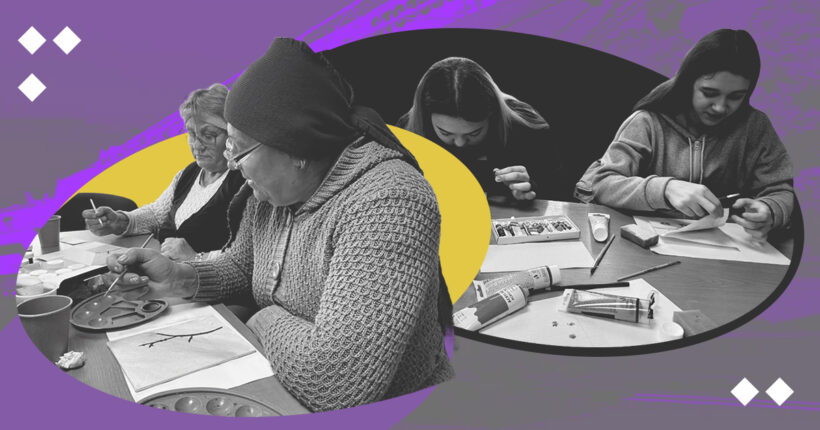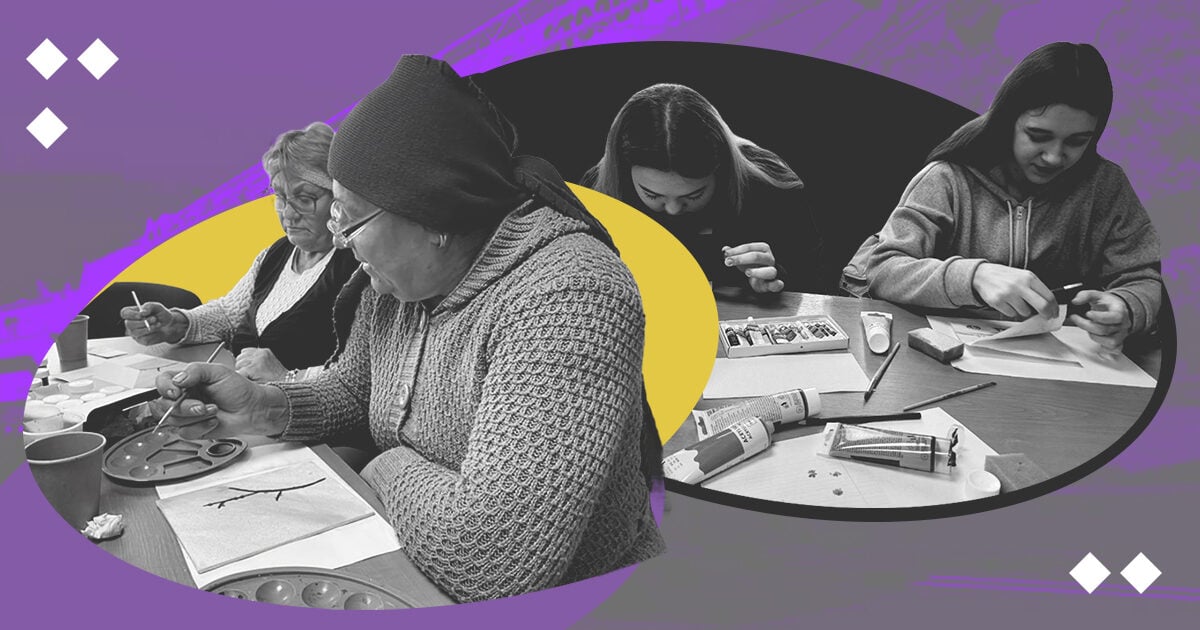
What's the problem?
The village of Zelenyi Hai, part of the Shevchenkove community in the Mykolaiv region, has been scarred by Russia's full-scale invasion. During hostilities, 80% of administrative and residential buildings were damaged. The local school was destroyed, and the kindergarten, the administration office, the health clinic, and the post office were severely damaged. The village had no electricity for eight months, which also meant no running water. Even the village library, once a cultural hub, suffered significant destruction.
What's the solution?
The residents of Zelenyi Hai began rebuilding their village during the height of the fighting. Together with energy workers, they restored electricity. Soon after, they wrote the first grant project in the community's history to establish a "resilience hub" and install solar panels on water towers.
Funding was scarce, so the entire village contributed what it could and sought support from charity foundations. These efforts bore fruit—the community installed a solar power station, replaced two towers, and repaired 1,200 meters of the water supply system, restoring reliable access to water.
"It was a great starting point for us. After the de-occupation of the right bank of [the Dnipro River], people began returning to the village," says Oksana Hnedko, head of the Zelenyi Hai administration. "Before the full-scale invasion, 1,200 people lived here; now, it's 800. At first, everyone focused on rebuilding their homes, and charity foundations prioritized humanitarian and medical aid. But soon, the need for a community center became clear. Alongside housing repairs, people needed legal consultations and psychological support for adults and children."
The local public organization Zelenjgay Initiative developed a new project to address these needs. Winning a grant through the Local Initiatives Project program, the nonprofit established a community center for all Zelenyi Hai residents.
How does it work?
The Zelenjgay Initiative nonprofit organization, founded in 2019, initially focused on improving the village and promoting environmental projects. After the full-scale invasion, most members left the country, leaving the organization in the hands of three women: NGO leader Yuliia Uchen, village head Oksana Hnedko, and Yuliia Usenko, a displaced woman from the neighboring Kherson region.
Thanks to their determination, Zelenyi Hai now has a new community center — a space for relaxation, growth, and gathering.
Before the center opened, activities for children and adults were held outdoors or in the local health clinic. The clinic was renovated earlier in 2023 by Doctors Without Borders.

A master class for children and adults on making snoods at a health center (the electricity went out during the class). Photo: Zelenjgay Initiative
"We knew that using a medical room was only a temporary solution. We desperately needed a dedicated space, and thanks to our partners and sponsors, that dream became a reality," says nonprofit leader Yuliia Uchen.
The center was set up in an administrative building by combining three unused offices on the ground floor. The village council restored the roof, windows, and doors, which had been damaged by a direct Russian strike earlier in the war. Renovation of the interior was made possible through the support of charity foundations and volunteers.
In late October, the community center officially opened its doors to everyone, regardless of age. "We didn't even have an official opening ceremony; the center began operating as soon as the renovations were completed," says Uchen. According to her, the center is designed to support community development, nurture young leaders, and unite people committed to positive change. Its purpose is to host events catering to nearly every population group.

Master class on painting cartridges. Photo: Zelenjgay Initiative
"Currently, most events are organized by charity foundations and NGOs," says NGO leader Yuliia Uchen. "We constantly receive proposals for different activities and always agree to host them because we see significant demand from the community."
Ten days after its launch, the center organized four recreational activities for children, one for teenagers, and two for women. The building also hosts legal consultations on property registration and applications for state recovery programs like eRecovery. Humanitarian aid distribution also takes place here.
Recreational activities include art therapy sessions and workshops, offering psychological relief for adults and children alike. Adult sessions are held every Thursday, while children's activities take place on Wednesdays. All services and events are free.
Does it really work?

A therapeutic art session on "My Life Values." Photo: Photo: Zelenjgay Initiative
During a warm and insightful "My Life Values" session, psychologist Liudmyla Romanenko guided women in sharing thoughts, stories, and inspiring experiences. The participants exchanged ideas on preserving their most cherished values and painted magnolias — a symbol of purity and beauty.
The "Women's Anxiety and Fear During Wartime" workshop session, conducted by the mobile social and psychological assistance team of the NGO Innovative Solutions, introduced women to practical methods for overcoming anxiety and fear. The participants discovered ways to tap into their inner resources.
The "Sexuality and Sex Appeal" meeting opened discussions about accepting individuality, finding harmony with one's body and feelings, and boosting self-esteem.

Art on eco-bags: a creative meeting of women. Photo: Zelenjgay Initiative
In a workshop on eco-bag painting, participants created personalized and stylish accessories while promoting eco-friendly practices.

Halloween party at the community center — children painting eco-bags. Photo: Zelenjgay Initiative
Meanwhile, the children got creative with Halloween-themed eco-bag painting. Their designs ranged from spiders and pumpkins to adorable ghosts, each bag becoming a unique expression of their imagination. Beyond creating practical and personalized accessories, the kids had a blast. The children also crafted items from natural materials and even experimented with "apple stamping," making the activities fun and eco-friendly.
Yuliia Uchen says that given that the local school was destroyed and their community is in a yellow danger zone, children must now study online. They lack opportunities for socialization. These events allow them to connect, be active, and engage with peers.
Liudmyla Romanenko, a social worker and psychologist with International Medical Corps, says creative therapy helps adults confront internal conflicts, reduce anxiety, and improve emotional well-being.
"These activities help boost self-esteem, improve emotional well-being, and build inner resilience to navigate the challenges of the ongoing war," says Liudmyla Romanenko. "Art therapy offers an eco-friendly approach to addressing the issues the village residents face. These sessions bring participants together, fostering a healthy psychological environment that improves the quality of life for all community."
Even more helpful solutions!
The nonprofit plans to expand the community center. The women aim to involve local youth and boost their movement across the entire community. Local youth want a football field with soft turf, English courses, and a Youth Council with a dedicated space. Efforts are underway to secure resources for these initiatives. Yuliia Uchen adds: the most important thing is that the youth are eager to get involved in bringing these ideas to life, and that's wonderful.
"We've always strived to make Zelenyi Hai a desirable place to live. This is our village, and we love it deeply and are proud of it," says Yuliya Uchen. "I wanted my children to want to stay in their hometown. Our center is another step toward growing Zelenyi Hai, and I hope it's not the last, as there's still a lot of work ahead."
Yuliia recounts a turning point for the village: during the bombing of the school, two key leaders — local administrator Mykola Stutynskyi and school principal Oleksandr Hnedko — were killed. Oleksandr's wife, Oksana Hnedko, a librarian and now a nonprofit member, stepped up amid her loss. She initially managed humanitarian efforts and was later elected as the village leader.
"Our village was rebuilt not with prayers but through the tireless effort of the village leader and our team," says Uchen. "Oksana has tried to provide locals with as much support as possible. Word-of-mouth works at full capacity, and the people of Zelenyi Hai compare themselves to neighboring villages and draw conclusions. That's why our people always come to help and take part in all village activities."

Gamified therapy sessions: How Ukrainian grandmothers are supporting children's mental health through play and purpose

All-women teams in Ukraine defy stereotypes and rebuild homes destroyed by war






